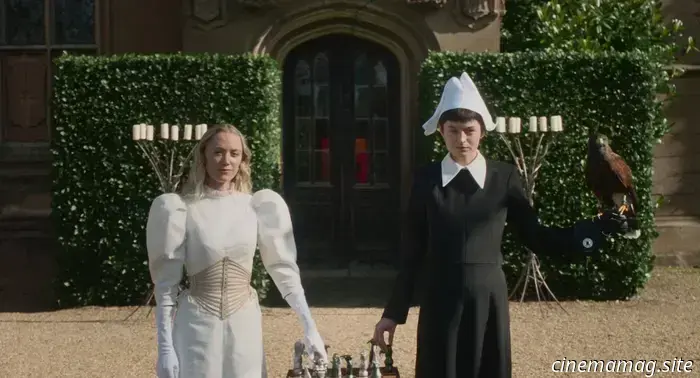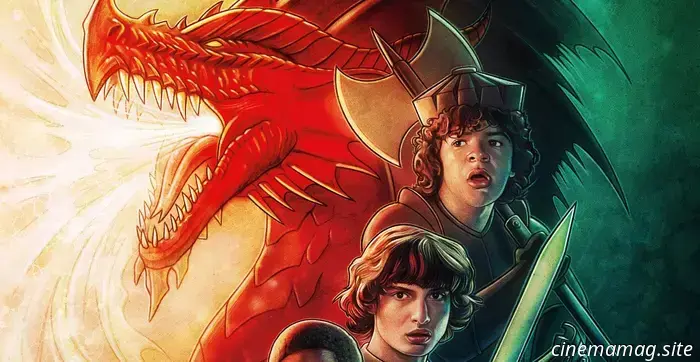
Paul Schrader reflects on the 40-year-late Japanese premiere of "Mishima: A Life in Four Chapters."
Japan is not typically recognized for restricting cinema; one could argue that many young film enthusiasts discover the country's extraordinarily intricate filmography through its most extreme selections. Although it is primarily an American endeavor, widely regarded as a masterpiece and relatively restrained within the director’s body of work, Paul Schrader’s Mishima: A Life in Four Chapters went 40 years without an official screening in Japan. A basic understanding of Yukio Mishima’s life, artistry, and lasting impact can provide some context for this somewhat unofficial ban, albeit with lingering uncertainties regarding its uneven enforcement. Nonetheless, the fact remains that Schrader’s multifaceted biopic, which is a common fixture in rep cinemas and currently available for streaming on the Criterion Channel for North American viewers, was regarded as contraband in its home country until just this past Wednesday, despite the future of its distribution still being somewhat ambiguous.
The audience at the Tokyo International Film Festival, usually quite reserved, exhibited an uncommon level of excitement leading up to the screening at Ginza’s spacious Hulic Hall—perhaps the rumors of a possible disruption had circulated and gained significance—though the extended introduction from Schrader, producer Mata Yamamoto, and associate producer Alan Poul was filled entirely with gratitude and emotion. Although there was some hesitancy throughout the film—while not aiming for the same responses as The Naked Gun—the applause at the end persisted for some time as Schrader paused at the theater exit to acknowledge his film's first-ever Japanese viewers. (His previous concerns articulated below, that native audiences might react negatively to certain nuances, proved unfounded.) The positive atmosphere continued into the evening’s afterparty, where the filmmaker was greeted by long-time collaborators, including Yuki Nagahara, who played a five-year-old Mishima and had never seen the film until that afternoon, along with various figures from the Japanese film industry.
I spoke with Schrader a day before Mishima’s premiere to discuss the film and its unusual revival. (Poul was present too but mostly remained quiet, apart from one amusing remark.) I have also attended two screenings of Schrader’s upcoming project, The Basics of Philosophy, and sprinkled some spoiler-free commentary throughout. Our conversation, along with exclusive photos from the production and premiere of Mishima featuring Schrader, Poul, and co-writer Chieko Schrader, follows.
The Film Stage: It was enjoyable watching Basics twice within two weeks and noticing differences—some quite minor and others, I would argue, more pronounced.
Paul Schrader: And now it has reached a whole new level because the music is no longer just a tempo track. Eli Keszler created the score, which is quite aggressive and original. Instead of trying to resist it, I found myself thinking, “Okay, I didn’t see that coming.” [Laughs]
I’m eager to experience it.
I believe it adds more depth.
It’s interesting seeing you here and then there, regarding two films that... I feel inclined to describe them as very distinct, yet I wonder if there are shared elements between them.
Well, the common thread is my origin with Taxi Driver and the concept of a solitary individual who keeps to himself, dwells in his thoughts, wears a mask, and whose mask is his profession. That concept evolves from a taxi driver to a gigolo, then to a drug dealer, a poker player, a gardener, and eventually a philosophy professor. Mishima differs slightly in that he’s a historical figure, but he is the kind I would have invented as a fictional character if he hadn’t existed.
It feels almost serendipitous that he was available for you to draw upon.
Yeah. [Laughs]
You’ve been candid about referring to it as your best-directed film.
I’m not... I’m not entirely certain. It’s the one I take the most pride in due to its uniqueness. I believe Affliction and First Reformed might be the most complete and solid films I've produced, and Light Sleeper is perhaps the closest to my heart. Yet, Mishima stands out given its outrageousness. I still can’t believe it was made and that I was the one to create it.
I greatly admire many of your films, but you are correct that Mishima is somewhat unparalleled in your work. It’s intriguing that it exists as such and that you didn't seek to replicate it. You haven't attempted to produce another film about an artist in that vein...
Actually, I tried but ultimately gave up. Here’s how it unfolded: I wanted to write another story about a lonely character and was working on a biography for Warner Bros. about Hank Williams, who passed away at 29, had severe back pain, was quite brooding and depressed, and addicted to morphine for his back as well as alcohol. I was trying to force his life to fit into Travis Bickle’s story; I was trying to fit a square peg into a round hole. Williams didn’t wish to die. [Laughs





Other articles
 Trailer for "100 Nights of Hero" featuring Emma Corrin, Nicholas Galitzine, and Maika Monroe.
With just over a month remaining before the launch of 100 Nights of Hero, IFC Films has released a new trailer for the fantasy romance directed and written by Julia Jackman. This film is inspired by Isabel Greenberg’s graphic...
Trailer for "100 Nights of Hero" featuring Emma Corrin, Nicholas Galitzine, and Maika Monroe.
With just over a month remaining before the launch of 100 Nights of Hero, IFC Films has released a new trailer for the fantasy romance directed and written by Julia Jackman. This film is inspired by Isabel Greenberg’s graphic...
 A Library Edition of Stranger Things and Dungeons & Dragons is set to be released in 2026.
As Netflix's flagship series Stranger Things wraps up this December, Dark Horse Comics aims to bridge the gap until the first spinoff arrives in May 2026 with the launch of...
A Library Edition of Stranger Things and Dungeons & Dragons is set to be released in 2026.
As Netflix's flagship series Stranger Things wraps up this December, Dark Horse Comics aims to bridge the gap until the first spinoff arrives in May 2026 with the launch of...
 13 Classic TV Shows That Remain Enjoyable to Watch
Here are 12 timeless classic TV shows that are sure to bring a smile to your face, even after all these years.
13 Classic TV Shows That Remain Enjoyable to Watch
Here are 12 timeless classic TV shows that are sure to bring a smile to your face, even after all these years.
 Wong Kar Wai's Blossoms Shanghai is set to premiere on Criterion Channel starting this month.
Two years following the premiere of Wong Kar Wai's Blossoms Shanghai in China, the highly anticipated series is set to debut in America. Starting on November 24, the Criterion Channel will exclusively launch the 30-episode series, releasing three new episodes every Monday night at 8 p.m. ET until the end of January. In preparation for the launch, a
Wong Kar Wai's Blossoms Shanghai is set to premiere on Criterion Channel starting this month.
Two years following the premiere of Wong Kar Wai's Blossoms Shanghai in China, the highly anticipated series is set to debut in America. Starting on November 24, the Criterion Channel will exclusively launch the 30-episode series, releasing three new episodes every Monday night at 8 p.m. ET until the end of January. In preparation for the launch, a
 The psychological thriller Krzyk: Losing Control has released its trailer and poster.
Freestyle Digital Media has released a trailer for the German psychological mystery thriller Krzyk: Losing Control, written and directed by Ewa Wikiel, in anticipation of its North American VOD release later this year.
The psychological thriller Krzyk: Losing Control has released its trailer and poster.
Freestyle Digital Media has released a trailer for the German psychological mystery thriller Krzyk: Losing Control, written and directed by Ewa Wikiel, in anticipation of its North American VOD release later this year.
Paul Schrader reflects on the 40-year-late Japanese premiere of "Mishima: A Life in Four Chapters."
Japan is not typically recognized for imposing restrictions on its films; one could argue that young film enthusiasts primarily access the country's incredibly vast collection through its most radical selections. Although it is best described as an American endeavor, it is widely regarded as a classic and is relatively mild in terms of content—it stands as one of the softer works in the director’s filmography—Paul
